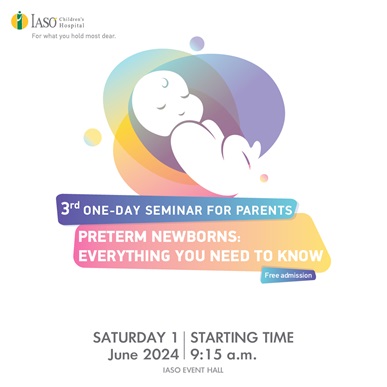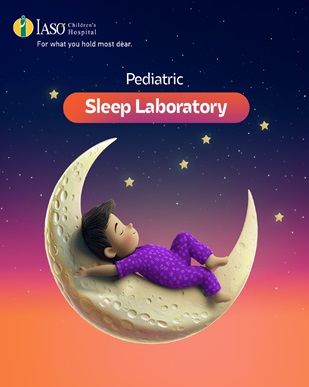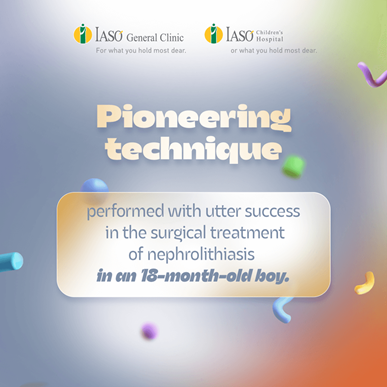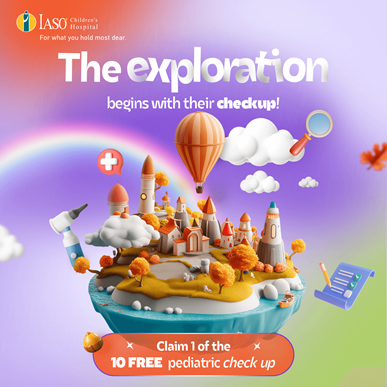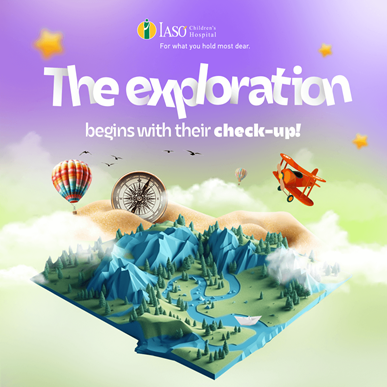
Cochlear Implant Center
E.N.T.
Hearing is a vital and irreplaceable sense, essential for everyone, both for communicating with people around them and for the perception of the environment. Modern technology and the development of Otolaryngology make it possible to restore hearing in people who have lost it during their lifetime or to infants and children who have never had it. Nowadays, we achieve this with the use of cochlear implants. In the entire history of medical science, this is happening for the first time for one of the five human senses.
The cochlear implant is the latest development in the treatment of severe hearing loss and deafness in children and adults. The Cochlear Implant Center of IASO General Clinic and IASO Children's Hospital is a certified cochlear implant center for all ages. It is able to offer specialized services for the evaluation, surgical treatment and rehabilitation of children, adolescents and adults with severe hearing loss.
Specifically, at the Cochlear Implant Center of IASO General Clinic and IASO Children's Hospital, provides the following services to children/parents and older patients:
- Assessment of the patient's auditory perception (of any age, from infancy to advanced age) with special hearing tests by experienced medical personnel.
- Assessment of the language skills of children and adolescents by specialized medical personnel.
- Evaluation of the patient's suitability for cochlear implant surgery.
- Provision of information through direct contact with interested parties (parents of children and older patients) as well as free printed material regarding cochlear implants and the surgical intervention required in each case.
- Surgical treatment of sensorineural hearing loss and other types of hearing loss (conductive or mixed hearing loss)
- Close monitoring and care of patients with implants during the immediate postoperative period.
- Continuous support to the patient and family (in terms of materials, technical requirements and training) for as long as necessary, in order to achieve the best final result of the implantation.
- Provision of information, training and collaboration with referring physicians and specialists who contribute to the learning process and rehabilitation of patients (pediatricians, ENTs, speech therapists, etc.).
INFORMATION FOR PARENTS
Hearing is a vital and irreplaceable sense, essential for everyone, both for communicating with people around them and for the perception of the environment.
Unfortunately, hearing loss is a common problem at all ages. Hearing aids cannot help all people with severe hearing loss. Fortunately, in many of these cases, a cochlear implant is an effective option.
The Cochlear Implant Center is a certified implant center for all ages. It is able to offer specialized services for the evaluation, surgical treatment and rehabilitation of children, adolescents and adults with severe hearing loss.
-
What is a cochlear implant?
A cochlear implant is an electronic device that will help your child hear. However, it cannot restore “normal” hearing, although, in many cases, it comes close to it. The Cochlear Implant bypasses the cochlea - which is usually responsible for hearing loss - in such a way that external sounds directly stimulate the auditory nerve.
The Cochlear Implant consists of external and internal parts:
The external parts include the speech processor and the microphone, which is placed behind the ear (like an earpiece) and the transmitter, which is placed on the head, above or below the hair.
The internal parts are the receiver/stimulator and the electrode, which are surgically implanted under the skin of the scalp and inside the cochlea, respectively.
The microphone captures the sounds of the environment and the speech processor converts them into digital signals, which are transmitted from the transmitter to the receiver/stimulator through the skin. They are then converted into electrical signals, sent to the electrode placed inside the cochlea, where they stimulate the auditory nerve. Finally, the auditory nerve carries the stimuli to the auditory cortex, where they are perceived as sound.
-
Which children are candidates for cochlear implant surgery?
Candidates for cochlear implantation are the children who have from severe hearing loss in both ears and who show little or no improvement in speech development with the use of hearing aids. They should meet the following conditions:
- Be older than 9 months old.
- Have severe hearing loss in both ears (>90dB).
- Have no improvement in their understanding and speech after 3-6 months of using appropriate hearing aids.
- Have no other serious health conditions that prohibit general anesthesia and surgery.
- Have the appropriate familial and social circumstances to benefit from the necessary special training
- Parents/guardians agree for their child to learn and use spoken language.
Despite the above general recommendations, each child with hearing loss should be evaluated individually. In certain cases, the Cochlear Implant is considered an appropriate solution even for children who do not fall into the above conditions (e.g. the hearing aid is helping but to an unsatisfactory degree, with inner ear abnormalities or other developmental disorders).
Deafness caused by meningitis should be treated separately and with urgent procedures, with no age limit.
-
Medical evaluation of the candidate child
Before the final decision on having the Cochlear Implant Surgery, every child that is a candidate should undergo:
- Detailed hearing screening. Due to the lack of cooperation from young children, this may require repeated visits to the audiology laboratory.
- Search for the cause of the hearing loss with tests recommended by the treating doctor (CT and/or MRI, blood test, etc.). Eye examination and fundoscopy, neurological assessment and electrocardiogram are considered essential. Genetic testing for hearing loss by searching for the mutation of the connexin 26 and 30 gene is recommended mainly in children without other accompanying health conditions or disorders.
- Evaluation of the child's speech and communication ability by a speech therapist and/or developmental-behavioral pediatrician.
- Pediatric examination in order to assess the child's overall health and reveal possible non-visible health conditions.
-
Cochlear implant selection and cost
Today, there are three cochlear implant companies in the Greek market (Advanced Bionics, Cochlear and ME-DEL). You can find information and details about each of them on the companies' websites.
In general, the function and effectiveness of Cochlear Implants are similar. There is no clear scientific data on the superiority of any implant over the others.The cost of a Cochlear Implant is high, but insurance funds cover the cost of its placement, provided that it has been approved by the Supreme Health Council (AYS) [formerly Central Board of Health (KESY)] and on the condition that the surgery will be performed at a recognized Implantation Center. Each child can have two Cochlear Implants placed in one surgery or in two consecutive surgeries, a few months apart.
-
Preparing for surgery
- Parents will be notified of the surgery at least 15 days in advance.
- The child should be in good health, without a cold, fever, ear infection, cough or severe rhinitis for at least one week before the surgery.
- The day before the surgery, the child may freely eat dinner and drink fluids. In the morning of the surgery, only small amounts of clear fluids (water, chamomile, tea) are allowed for up to two hours before the surgery.
- The surgery is performed under general anesthesia and lasts approximately 3-4 hours. The child can return home even on the same night, if they have “recovered” from the procedure and anesthesia and have started drinking fluids. However, parents should be prepared for a few days of hospital stay, such as in cases of complications or for children living in the provinces.
- Children with Cochlear Implants have a statistically higher incidence of meningitis. For this reason, every child who is going to undergo a cochlear implant surgery should be vaccinated against the most common bacteria that cause meningitis (mainly pneumococcus, but also Haemophilus influenzae type b and meningococcus).
-
Risks of cochlear implant surgery
- Loss of residual hearing in the ear it is implanted.
- Statistically higher incidence of meningitis compared to other children.
- Irritation of the facial nerve, i.e. the nerve that gives commands for facial movements, and involuntary facial movements.
- Contamination/infection, swelling and wound dehiscence, which may require many days of conservative treatment or surgery or even removal of the implant.
- Failure of the surgery due to serious anatomical abnormalities of the ear and risk to the child's life or physical health.
- Implant failure and its replacement.
- Finally, Cochlear Implant surgery includes the risks of all ear surgeries (facial hypoesthesia, change in the sense of taste, dizziness and tinnitus, temporary or permanent damage to the facial nerve, postoperative pain), as well as the general complications of all surgeries (from the general anesthesia, cardiological complications, allergic reactions, etc.).
-
After the cochlear implant surgery
In the first few days following the surgery, frequent visits will be needed to care for the wound. The sutures are removed in approximately 10 days. During this time, painkillers may be needed. Mild instability in the child's gait is expected and usually temporary.
The device is activated 3-4 weeks after the surgery. In addition to the initial programming of the implant, instructions are provided for the use of the device, its maintenance and the warranty.
During the first months, as the hearing improves, several visits will be needed to adjust the device, even on a monthly basis. After the first year and during school age, visits for adjusting the Cochlear Implant are taking place every 6 months, and afterwards, on an annual basis. Depending on the case and needs, the visits for adjustment may be altered. -
Expectations and results of cochlear implant surgery
- Determinants of the child's progress are the age of diagnosis of hearing loss, the age of implantation, the coexistence of other anatomical abnormalities in the ear or brain, the child's psychomotor development, the family environment and the consistency in using the device. These factors should be assessed before the decision on the surgery.
- Every child who receives a Cochlear Implant after a proper evaluation, will benefit from its use. Most manage to hear and understand environmental sounds and voice commands, while their lip-reading ability increases. Some will be able to participate in free conversation at a normal voice level. Finally, several will be able to use the phone, listen to music and attend “normal” school, alongside children with normal hearing.
The benefits of a Cochlear Implant cannot be accurately predicted before surgery. - For better results, the child should use the device at all times, except when sleeping and bathing. Continuous use of the device, proper treatment and practice can improve the child's auditory skills significantly. The development of speech requires time and auditory experiences, both for children with normal hearing and those with hearing loss.
- Parents should offer the child a lot of audio information, read aloud to them on a daily basis and talk to them about things that happen at home and at school.
- The stability and persistence of the parents in auditory communication and the development of their child's oral skills are crucial for the success of the Cochlear Implant. It is essential for the parents to be guided by a specialized speech therapist about how to approach the child in the best way possible.
- The final result of the Cochlear Implant is not the same in all cases: Each child is unique!
-
Supporting documents for cochlear implant surgery
- Application to the insurance carrier for approval of the cochlear implant surgery with a complete medical record that must include:
- A comprehensive audiological examination with
- Tympanometry,
- Auditory evoked potentials and otoacoustic emissions,
- ASSR (when possible),
- Free-field audiometry and visual reinforcement audiometry (when possible),
- Pure-tone audiometry and speech audiometry with hearing aids (when possible).
- CT and MRI with their reports.
- Certificate by a speech therapist on speech development (progress, stagnation or regression).
- Pediatric report (general state of health, coexisting conditions, etc.).
- Pediatric psychiatric assessment (or pediatric psychological assessment, when deemed necessary by the pediatrician).
- Medical certificate for hearing loss and the need for a cochlear implant from the treating Otolaryngologist.
ATTENTION:
The above instructions are for informational purposes only. Under no circumstances should they replace an examination by your doctor. - Application to the insurance carrier for approval of the cochlear implant surgery with a complete medical record that must include:
-
Why choose the Cochlear Implant Center of IASO General Clinic and IASO Children's Hospital for Cochlear Implant Surgery
- A complete medical team with all the necessary specialists for the evaluation and treatment of children or adults with hearing loss:
- ENT Surgeons
- Audiologists
- Speech therapist
- Psychologist
- Social worker
- ENT surgery team consisting of doctors with long-term experience in the treatment of hearing loss and other ear conditions
- Technologically well-equipped operating rooms
- Modern audiology laboratory, staffed by specialized audiologists
- Ability to treat difficult cases with anatomical abnormalities
- Ability to treat unilateral or asymmetrical hearing loss
- Believing in the principle “the sooner the better for the child with hearing loss”, we have taken all necessary actions so that you will not have to wait for your surgery at the Cochlear Implant Center of IASO General Clinic and IASO Children's Hospital.
- A complete medical team with all the necessary specialists for the evaluation and treatment of children or adults with hearing loss:






